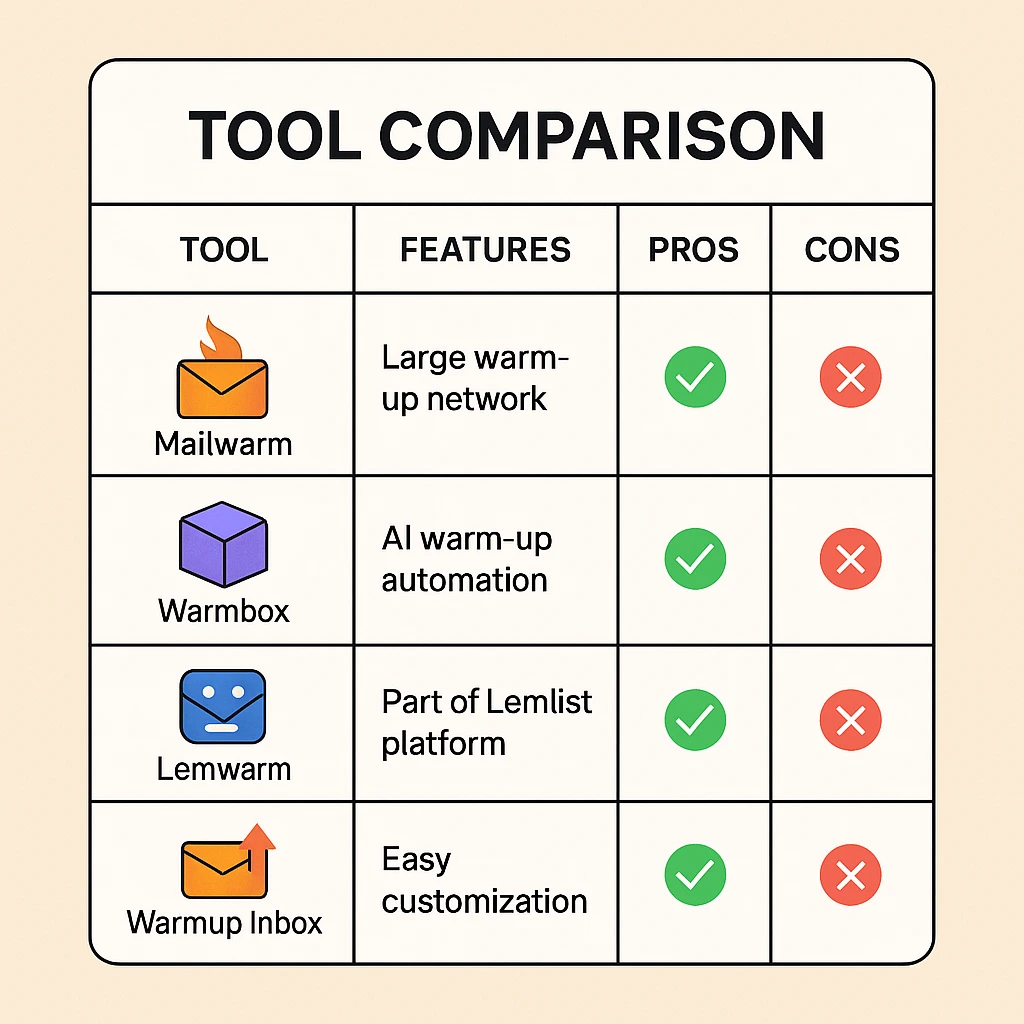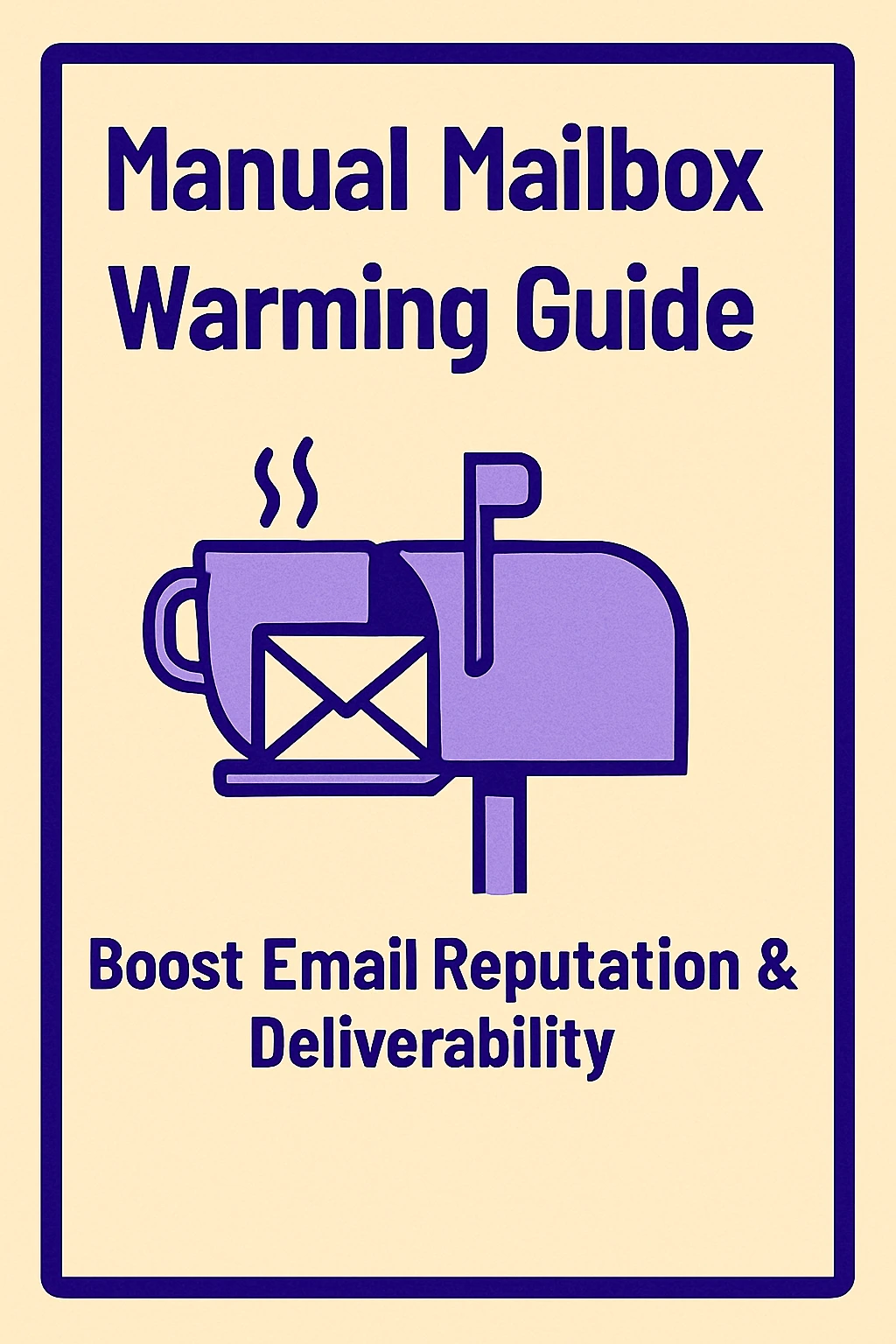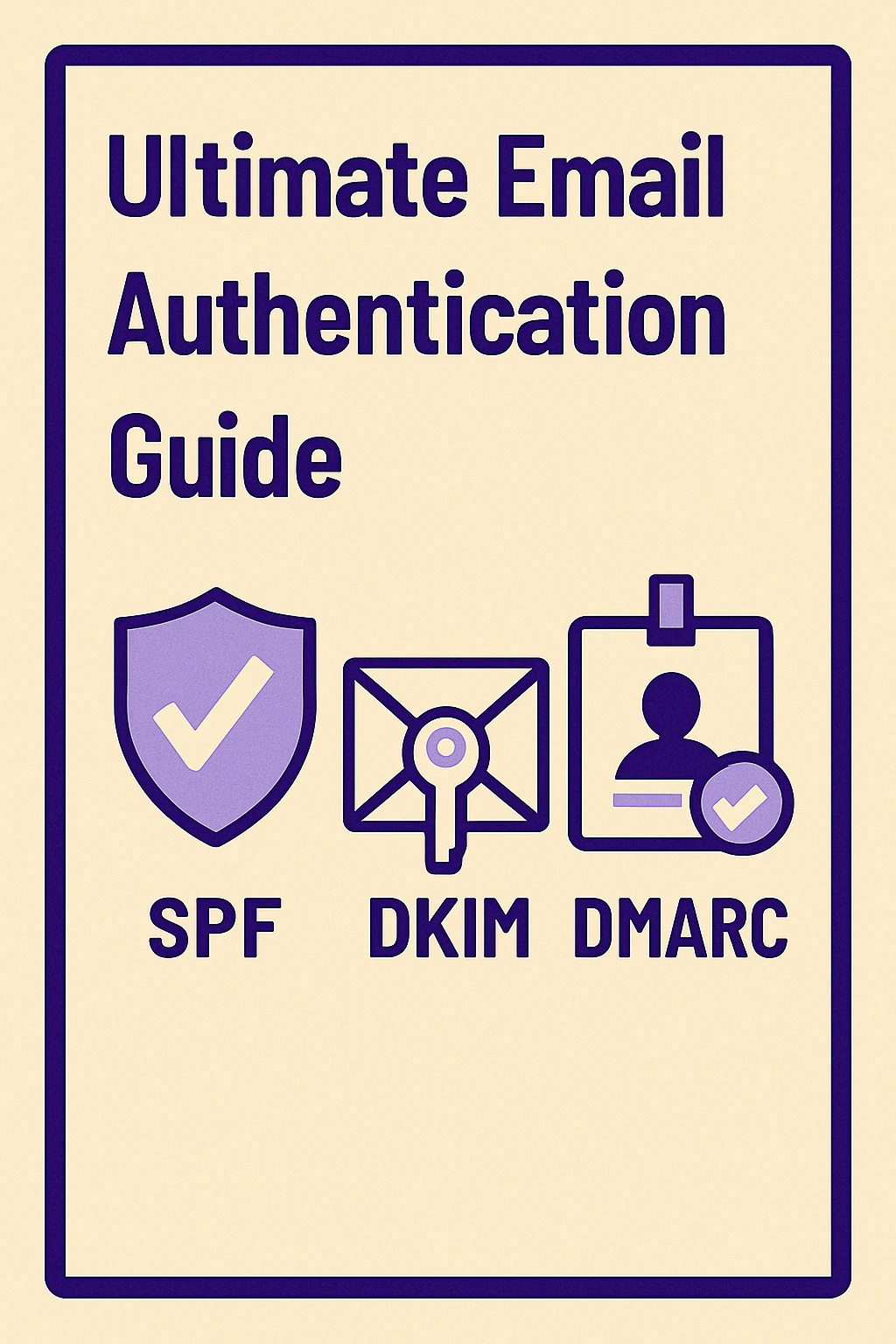Top 5 Email Warm-Up Tools with Inbox Placement Monitoring
In 2025, mastering cold email outreach requires more than just compelling copy—it demands a strong sender reputation backed by effective email warm-up and real-time inbox placement monitoring. This blog dives deep into why email warm-up tools are essential for GSuite and other platforms, especially as spam filters tighten and inbox competition heats up. We explore how warm-up tools gradually build your domain’s credibility with ISPs, preventing your emails from landing in spam and boosting open rates. You'll learn why monitoring inbox placement—the exact location where your emails land—is critical for adjusting your campaigns and maintaining high deliverability. The post also highlights the top 5 email warm-up tools for 2025, including MailKarma, Warmbox, Lemwarm, Mailwarm, and Folderly, comparing their standout features, pricing, and ideal use cases. From beginners to agencies and SaaS teams, this guide helps you choose the right tool to protect your sender reputation and maximize cold outreach success. Finally, practical tips on setting up warm-up schedules, tracking key metrics, and best practices for post-warm-up cold emailing round out the guide. Whether you’re just starting or scaling your outreach, this blog is your go-to resource for ensuring your emails reach the right inbox—every time.

In 2025, using email warm-up tools with inbox placement monitoring isn’t optional—it’s essential. With tighter spam filters and rising competition in inboxes, your emails need all the help they can get.
If your cold outreach emails are being ignored or, worse, sent to spam, it might not be your copy—it could be your sender's reputation. That’s where email warm-up tools with inbox placement monitoring step in to save the day.
What Are Email Warm-Up Tools and Why Do You Need Inbox Placement Monitoring?
The Role of Email Warm-Up in Cold Outreach
When you launch a new email domain or start sending cold emails, your domain doesn’t yet have a reputation. Email warm-up tools help you build credibility with ISPs by gradually increasing your sending volume and simulating real conversations.
This is vital for cold outreach success because it prevents sudden activity that could land your emails in the spam folder. Think of it as social proof but for your domain.
How Inbox Placement Impacts Email Deliverability
Inbox placement monitoring tells you where your email lands—Primary inbox, Promotions, or Spam. It’s a critical piece of email performance monitoring that ensures your emails are seen by real people, not filtered out by algorithms.
Common Challenges: Spam Folder, Low Open Rates, Poor Sender Reputation
- Your emails hit the spam folder without warning
- Engagement metrics drop with every send
- IP reputation and domain reputation suffer
How Monitoring Inbox Placement Solves These Issues
- Tracks inbox rate and alerts you to issues
- Helps avoid spam folders through early detection
- Increases email engagement by ensuring visibility
Key Features to Look for in an Email Warm-Up Tool (2025 Edition)
Real-Time Inbox Placement Reporting
You need to know exactly where your emails are landing. Real-time reporting lets you tweak your strategy before your reputation suffers.
Automatic Warm-Up Scheduling
Email warm-up automation saves time and ensures consistent results. Tools that auto-adjust send volume are ideal.
Domain & IP Reputation Tracking
Watch your domain reputation grow. Tools that monitor both IP and domain metrics help build a strong foundation.
Spam Trap Detection
Avoid spam folder disasters with tools that detect spam traps before it's too late.
Integration with Email Platforms (e.g., Gmail, Outlook)
A seamless setup is a must. The best email warm-up tools easily integrate with popular email clients.
Top 5 Email Warm-Up Tools with Inbox Placement Monitoring (2025)

MailKarma
MailKarma is a modern warm-up and deliverability optimization tool built to help your emails consistently land in inboxes, not spam folders. With a focus on user-friendly automation, smart engagement simulation, and domain reputation tracking, it’s perfect for businesses serious about protecting their email credibility.
Standout Features
- Advanced inbox placement monitoring and warm-up automation
- Tracks IP reputation, domain health, and inbox rate in real time
- Seamless integrations with Gmail, Outlook, and major CRMs
Pros & Cons
Pros: All-in-one warm-up and monitoring suite, beginner-friendly UI
Cons: Limited to premium users for advanced analytics
Best For
Marketers and agencies serious about cold outreach success
Pricing:
Starting at just $2.5 per inbox, it’s an affordable solution for businesses looking to improve their email strategies.
Warmbox
Warmbox adapts your warm-up schedule based on sending behavior, simulating human-like actions across various inboxes. It's ideal for agencies and consultants managing multiple domains or cold email campaigns.
Standout Features
- Real-time inbox placement tracking
- Email warm-up automation with SMTP warm-up support
- Email authentication (SPF, DKIM, DMARC) checks
Pros & Cons
Pros: Reliable monitoring, smooth integration Cons: Slightly expensive for beginners
Best For
Agencies and freelancers looking for plug-and-play simplicity
Lemwarm by Lemlist
Lemwarm shines when paired with Lemlist, offering Gmail-optimized warm-up flows and deep engagement simulations. It's especially powerful for marketers and cold outreach teams using Google Workspace.
Standout Features
- Integrated with Lemlist CRM for cold outreach
- Engages in simulated conversations to boost engagement metrics
- Syncs with your Lemlist campaigns automatically
Pros & Cons
Pros: Great UI, perfect for Lemlist users Cons: Limited features for non-Lemlist accounts
Best For
Cold email outreach pros already using Lemlist
Mailwarm
MailWarm is an easy-to-use warm-up tool designed for professionals who want a hassle-free setup and reliable daily email activity simulation. It’s a great pick for freelancers or small teams that don't need deep analytics or integrations.
Standout Features
- AI-driven warm-up with inbox placement monitoring
- Custom email frequency and volume controls
- Supports domain reputation building with live metrics
Pros & Cons
Pros: Excellent email engagement reporting Cons: Basic UI
Best For
Startups and solo professionals needing granular control
Folderly
Folderly is an advanced email deliverability platform designed to help businesses improve inbox placement and avoid spam filters. It offers tools for diagnosing email issues, monitoring sender reputation, and optimizing campaigns. By providing actionable insights and automated warm-up features, Folderly helps ensure your emails reach the right audience effectively.
Standout Features
- Advanced spam folder avoidance strategies
- Comprehensive email performance monitoring
- Real-time tracking of inbox rate and domain health
Pros & Cons
Pros: In-depth analytics and reporting Cons: Premium pricing
Best For
SaaS companies focused on deliverability
Comparative Analysis Table of the Tools
Feature Set
All five tools offer core warm-up features, but Folderly and MailKarma stand out with deeper analytics.
Pricing
- Warmy.io and Mailwarm: Budget-friendly
- Folderly: Premium pricing
- Warmbox: Mid-tier
- Lemwarm: Bundled with Lemlist
- MailKarma: Mid to premium range with great value
Inbox Placement Accuracy
Folderly and MailKarma lead in accuracy with over 90% inbox placement success.
Warm-Up Speed
Lemwarm and MailKarma offer faster results, ideal for urgent campaigns.
Support & Integrations
MailKarma and Warmbox have broader integrations across Gmail and Outlook platforms.
How to Use These Tools to Maximize Cold Email Outreach Success
Step-by-Step Guide to Setting Up Warm-Up
- Connect your email account to the tool
- Set daily volume and sending limits
- Begin an automatic warm-up schedule
- Track inbox placement and adjust accordingly
Monitoring Metrics That Matter
- Email engagement metrics like opens and replies
- Inbox rate tracking
- IP and domain reputation
Best Practices for Cold Emailing After Warm-Up
- Personalize each message
- Avoid spammy words
- Monitor ongoing inbox placement
Explore more success strategies at Mailkarma. Their email warm-up tools with inbox placement monitoring are designed for cold outreach success.
Final Thoughts: Choosing the Right Email Warm-Up Tool in 2025
When to Upgrade to Paid Plans
If you're sending more than 100 emails/day or handling multiple domains, upgrading is worth it for reputation tracking and spam trap protection.
Recommendations Based on the Use Case
- Freelancers: Mailwarm or Warmy.io
- Agencies: Warmbox or MailKarma
- SaaS Teams: Folderly
- CRM Users: Lemwarm
MailKarma is another great option to explore when looking for dependable, feature-rich inbox placement monitoring and warm-up solutions. Give it a try to improve your cold outreach results.
Tool Overview
- MailKarma: Complete solution with inbox rate tracking, IP reputation insights, and warm-up automation
- Warmbox: Easy to use, great monitoring
- Lemwarm: Best for CRM users
- Mailwarm: Budget-friendly and customizable
- Folder: Premium features for deliverability pros
Conclusion
Choosing the right email warm-up tools with inbox placement monitoring can dramatically improve your cold email strategy. By boosting your domain reputation, avoiding the spam folder, and monitoring real inbox performance, you ensure your emails do what they’re supposed to do—get read.
Don’t forget to check out Mailkarma for a trustworthy and proven platform to improve email deliverability.
FAQs
Q1: Why is email warm-up important for new domains?
It helps establish a good domain reputation and prevents emails from landing in spam folders.
Q2: How long should I use warm-up tools before full outreach?
Usually 2-4 weeks, depending on your sending volume.
Q3: Can I use these tools with any email provider?
Most tools integrate with Gmail, Outlook, and custom SMTP.
Q4: What happens if I stop using a warm-up tool suddenly?
You risk damaging your sender's reputation and lower deliverability rates.
Q5: Are there free warm-up tools available?
Yes, but free versions may lack inbox placement monitoring and domain/IP tracking.
Recent Blogs
FAQs: Everything You’re Wondering About Cold Email Deliverability & MailKarma’s Infrastructure
MailKarma is a dedicated email infrastructure solution built exclusively for cold email outreach. Unlike shared inbox tools or general ESPs, MailKarma gives you complete control over your sending setup—private US IPs, clean domains, and expert-backed deliverability practices. Built by cold email pros, MailKarma is optimized to scale outreach without landing in spam.
Because MailKarma sets up private infrastructure—including custom domains and mailboxes—it doesn’t offer a traditional free trial. However, you can explore the platform, view your dashboard, and test features before provisioning infrastructure. Our private dedicated email servers cost $150 per server plus $0.001 per email sent, making it extremely cost-effective for high-volume cold email campaigns. For Gmail Workspace solutions, pricing starts at $3.50 per email with a 10-email minimum, dropping to $2.50 per email for volumes over 100 emails. This transparent pricing model ensures you only pay for what you use while maintaining enterprise-grade email deliverability.
Yes. MailKarma automatically sets up SPF, DKIM, and DMARC records using best-in-class standards. No technical hassle—our system handles everything behind the scenes, and our support team is always ready to assist if needed.
Every MailKarma subscription includes:
- Automated DNS setup (SPF, DKIM, DMARC)
- Private mailbox hosting
- Ongoing deliverability optimization
- Server monitoring and uptime guarantees
It depends on your monthly sending volume and the number of contacts per sequence. To simplify this, MailKarma includes a volume-based calculator inside the app to help you choose the optimal setup for scale, safety, and inbox placement.
Gmail and Outlook aren't built for cold outreach—they throttle volume, rotate IPs, and limit deliverability. MailKarma gives you:
- Dedicated infrastructure
- Warmed IPs and aged domains
- No shared resources
- Built-in best practices for cold outreach
It's the infrastructure your outreach actually needs.

.png)



